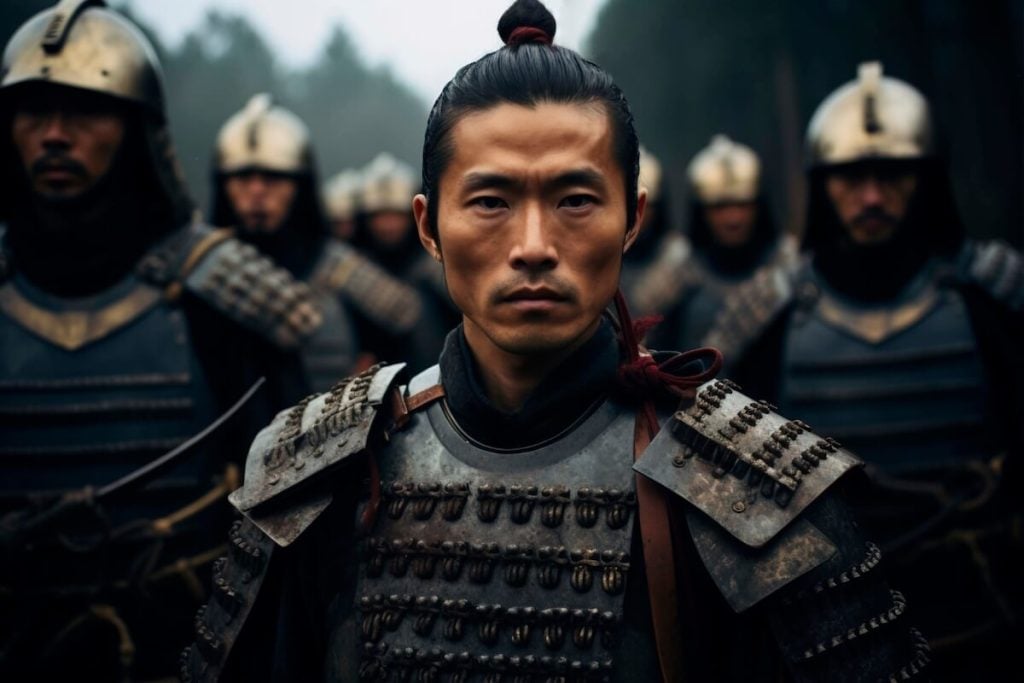Zoe came to me curious about who she was in her past life.
I’m a little cautious of past life review sessions because not every session leads to something vivid or complete. I always make it clear that they might see nothing at all. The subconscious mind decides what the individual is ready to see.
Fortunately, luck was on our side that day. Within minutes, Zoe was standing in the middle of a battle.
A young girl in a field of blood
Zoe: It's a battlefield.
Eugene: A battlefield?
Z: Yeah. Back in the ancient times where people are still using physical weapons, like swords and everything, there are a lot of people they are fighting, but they don't really know what they're fighting for anymore. And there is a lot of blood, but very strangely, I can't smell any.
Z: And it's very chaotic.
While it’s unusual for people to smell something during the session, it does happen. In one of my sessions, my client remarked that she could smell the smoke.
Technically, all of your 5 senses can get impressions. But most frequently, it’s sight and sound. Sometimes you get physical sensations too as you’ll see later.
It’s fascinating how the senses can come alive during a past life regression therapy session.
E: From your vantage point from where you're standing, what are the features of the land around you? Can you describe it in greater detail? So you see a lot of people, lots of blood. What else do you see?
Z: It's a very wide and open land. The weather is actually nice, like 20 plus degrees, a little bit dry. But it's such a waste of the good weather because they're fighting. There are probably 5,000 people on the land. And behind them there are also people playing the drum, the kind that supposed to boost their morale. And actually I don't see anything else other than the land. I don't know where their cities are, where the castles are. They're just fighting there.
When she spoke, she used present tense and first person pronouns, not “I saw” or “it was,” but “I see,” “I’m standing.” That’s the mark of an associated and immersive session. She wasn’t imagining a story; she was living it.
This is the most ideal kind of session because she thinks and feels as if she’s THE past life personality. Associated reliving enables me to gather detailed descriptions of the past life. It doesn’t always occur but when it does, the session flows very smoothly.
E: So you're in the midst of a major battle and do you see only foot soldiers or do you see horses as well?
Z: There are horses, but because it seems like it's already the end, towards the end of a long battle, one that might have, I'm not sure, lasted for hours or even days. Everyone was just tired. And there were just a lot of dead bodies. And dead horses.
E: Dead bodies and dead horses.
The bloodshed was widespread and the exhaustion in the air was palpable.
Z: And some like those wagons.
E: Wagons. Okay.
Z: Yeah. Lying around this battle.
E: And what do you see the soldiers dressed in? What is their outfit?
Z: The ones on your side maybe like metal armour? And helmets.
E: Is it full metal, as in like all shiny metal? Are there insignias, symbols and other features on the armour?
Z: It's strange because both sides of the armies are wearing almost the same kind of armour. I can't really tell who's from which side, like which soldiers, from which country. Maybe they can't tell either. That's why the fight never ends. And it's shimmering under the sunlight. It's not entirely metal, but it's definitely very metallic. And it must be heavy to wear one. But they don't complain because they know that's what's gonna protect them.
The picture she painted was puzzling. The armies should be wearing different armour so why would they look the same? Clarity would be gained towards the end of the session.
E: So what do you wear?
Z: I don't wear. I feel like I'm still invisible to them because I'm still safe. But if I am, once I become visible, they will. Maybe they will just stab me in the stomach or in the heart and then I will be gone. And I certainly cannot wear a heavy metallic armor like that.
E: Why not?
Z: Because it's too heavy for me.
E: Why don't you look at your features? So when you look down at your feet, what do you see there?
Z: I'm wearing. I'm wearing those slippers, those flip flops made of grass or like those. Those like grass like material in the past.
E: Right. They're very basic kind. And what are you wearing from waist down?
Z: Oh, now I can see myself. I'm wearing this really simple, even shabby, like cloth kind of dress with a belt that's made of some string just so that it doesn't swing around because it's a little bit too big. It's probably not even my coat. And then my hair is kind of long and I think I'm holding a small knife. The short kind. And actually I have blood on my left hand and I'm holding a knife on my right. But I don't recall having killed anyone. I'm just standing there. I feel lost.
A battle scene might mark the end of the lifetime. Death scenes often open into the afterlife. But I wanted to trace her story further back to a happy moment, to see what kind of life she had before she landed in the battlefield.
The man of silence
E: Drift back in time back to a happy moment in that lifetime and tell me the first impressions.
Z: I was eating raw seafood, like sashimi.
Z: In a nice restaurant or it could be my house. I'm not sure. Not just by myself. With a man who's obviously older.

In a luxurious private dining room painted in red and gold, she sat in silence with an older man who clearly exuded power. She wanted to speak to him, but fear held her tongue. When I asked who he was, she said softly, “He’s probably my dad.”
Intuition guides these moments. She didn’t think it was her father, she felt it. In hypnosis, intuitive, gut feeling doesn’t need logic.
E: Tell me, how are you interacting with this older man?
Z: We were just eating in silence. I feel like I had an urge to share a lot of things with him, but I'm not sure what exactly I wanted to share. Maybe I just wanted to talk to him, but I was also afraid that that would upset him or annoy him while we are eating.
E: Why would you feel that way?
Z: I'm not sure. I know that he definitely cares for me, but he looks like he has a lot of power and authority. So I couldn't bring myself to start a conversation.
The scene then shifted. The same man appeared again, this time trying to drown her in a pond.
Z: I suddenly see this image that he was trying to drown me in a pond. But when I was about to die, he pulled me out.
Z: I don't exactly remember why he does that. Maybe because he had a bad day, or probably because he was trying to punish me. But for a moment, I couldn't discern whether he really wanted me dead.
E: Let's explore this. Go to the moment just before he tries to drown you. And what are your impressions?
Z: I wasn't doing anything. I was just squatting in front of the pond. It's probably spring. It's full of lotus or whatever flowers there are in the pond. And then seeing the fish. I was much younger than the me eating sashimi with him, and I didn't know he was behind me. And all of a sudden, he grabbed my neck and drowned me in the pond. But he was younger and even more strong. And he didn't say a word. In fact, I wasn't sure it was him at the first moment until I felt his grief. Then I realized it was my father was trying to drown me.
E: So you didn't drown. And what happens next? Stay in that scene. What happens after he tries to drown you. Did you manage to get up or he pulled you out?
Z: He pulled me out. And then he was standing. Because I was a very small child. I just sat on the ground and trying to catch my breath. And I looked up to him. It was very sunny, and I could hardly see his face, because the sun was right behind him. And I didn't even dare to cry because I am scared that that also might upset him. And I was just trying my best to find the next thing that would please him. For him to spare me. I was very clueless.
She was a small innocent child, and he was silent, cold, and precise. When she survived, he simply told a guard, “Clean it up.” The chilling words terrified her as she imagined that the guard would end her life..
Zoe teared as she relived that moment. Such emotional depth is unlikely to be fabricated. The body remembers; the body keeps the score.
My father, the warlord
Zoe described her past life father as a warrior: tall, lean, and disciplined, with the bearing of a soldier. He never smiles but frowns occasionally – almost devoid of emotions. Even his cruelty was measured.
She sensed that he commanded men, not just a household. When I asked about his clothing, she described light armour and dark, well-kept hair. He was always covered, even in summer.

When I asked why he treated her this way, the memories shifted to a festival where he handed her a peeled orange. It was the only time she felt warmth from him.
Z: What I see now is maybe I'm one or two years younger. And I'm sitting on the floor again and just playing. It's probably some festival. And we could hear a lot of celebratory sounds outside, like the drums or maybe even the firecrackers. And then he handed me an orange, a peeled orange. And I was happy. And I ate the orange. And he was just sitting there, not reading his book, not writing anything, and was just staring at me. He didn't smile or frown or say a word. He just watched me finish the whole orange. And I don't know what happened next. I think that felt like a very sweet moment.
Then she remembered something else: he had once left her in a forest for an entire day.
Z: Now I remember before giving me the orange, before all that, he left me in the forest. He left me in the forest for one whole day before coming to find me. Now I remember. I don't think it was the first time or the last time he did something terrible to me, like abandoning me or drowning me. He never physically hit me, but there were always all sorts of ways to make me feel pain. But then sometimes he's really, really nice to me. I think his way of expressing his care is always offering me good food.
E: So he doesn't beat you physically, but he does these kind of things to punish you?
Z: Intimidate me.
E: It feels like he's intimidating you?
Z: Yeah, because I don't remember doing anything wrong. I was just a child. I wasn't capable of doing anything severely bad.
E: And when he leaves you in the forest, before and after he does that, did he say anything to you on why he did that and for what?
Z: No, I don't think so. I remember he led me to the forest. I thought we were going on an adventure. And then he pointed at one of the trees, asked me to stand in front of the tree and to not move. He said, stand there, don't move. And he turned around and left. I don't know whether it was one day or two after that, he sent a guard to fetch me. I'm not sure how I survived, but I didn't move from that tree at all.
E: Okay, and tune into this child and be in her shoes. See through her eyes, feel her feelings, think her thoughts. So as a young child, how do you feel about being left behind this way?
Z: I was confused. I wasn't angry. I was just very confused and anxious. And I was desperate to please him, actually. I followed exactly whatever he told me to do. I wish I could see him smile at me or be approving of even just one thing that I do.
Survival through silence
The girl grew up believing that speaking first could cost lives. She saw a servant beaten to death because he asked her father a foolish question. Noise, emotion, even crying were all dangerous.
Still, she believed he cared for her. He fed her, gave her fine clothes, hired a tutor to teach her writing with a brush. She wrote about mountains and seas she’d never seen. When I asked what script she used, she said, “Traditional Chinese characters.” I had suspected this was set in ancient China and her answer confirmed it.
Her mother was noticeably absent, replaced by female servants who played that role since her father was nowhere close to being a nurturing figure.
She lived in privilege but isolation, constantly trying to be good enough. Once, she wrote a letter to her father and then burned it.
E: Apart from your interactions with dad and the people he hired to take care of you, what else can you tell me about your day to day life as this personality?
Z: I don't go out of the house much. Even from a young age. I don't sneak out or I guess I just wasn't curious enough or even if I was curious, I knew that being caught while I sneaked out of the house would have very severe consequences. Sometimes I don't see him in days. There were a lot of people in the house. Actually we have a lot of land and garden. It does seem like we often had visitors, but I was never allowed, or rather the visitors were never allowed to be near me. I would be curious though, so I would peek from like the window to see who walk past or to see what's going on outside. And there was once I burned the papers. I forgot why, but I did it on purpose. I burned some scripts that I wrote. Maybe it was a letter to my father. I burned it before even passing it to him.
E: Why so?
Z: Because it would never be good enough for him. Maybe he will criticise my handwriting or the content or I wanted to tell him I miss him in the letter. He probably wouldn't like that either. So I burnt it.
The fall of the warlord’s regime
I moved her forward in time, thinking there would be more to her father but the story takes an unexpected turn.
Z: He fell sick. It's after that nice meal in that nice restaurant. It's probably before the battle.
Z: I see him lying on the bed. Even when he was sick, he had no facial expression. The doctor said he must be in a lot of pain. But he doesn't frown. He opens his eyes, turned his head and looked at me. I was happy because maybe for days we haven't interacted. He was just lying on the bed.
Z: I think he died soon after.
E: So what do you say to him?
Z: I didn't say anything.
E: The both of you don't exchange words?
Z: Not that I can remember. I never call him, like, father or dad. Not even once.

The fall of the house
Afterwards, she unexpectedly finds herself back in the battle scene where she first started.
There were gaps in the story so I got her to rewind to before the battle. This rewinding mechanism works because the files of all your existences and experiences reside in the library of your soul.
The death of her father, the leader that held everyone together, was followed by the departure of the servants and guards.
Z: I still stayed in the house, but there were fewer and fewer servants, fewer and fewer guards in the house every day. Everyone has seemed to forget about me.
E: So if dad is gone, do you inherit the house and all the servants and all the resources?
Z: I think by right I do. But I was still young, and I didn't have the ability to control people who were under him. So they just left.
E: How young do you feel?
Z: 12 or 13.
Thieves, or perhaps soldiers, raided the house of its belongings. Zoe realised the battle she’d first seen might have been a coup, fought between her father’s former men. They had once served the same great leader – her father, the warlord – and then turned against each other to secure her father’s power.
Z: In the battlefield, the people are dressed in a very, very similar way. So similar that I can't tell the difference. Friends. Because they both served my father when he was still alive.
E: It looks like a military coup.
Z: Yes.
E: How does the coup take place at the start? And tell me if you get any impressions about it.
Z: One day, a guy who I often saw reporting to my father when he was still alive came to our house and took a lot of scripts or basically papers away or scrolls. I'm not sure he took a lot of those away.
Z: The soldier or maybe that general saw me hiding behind the Door. He stared at me, but he didn't talk to me or come closer. And then very quickly after, he left.
The girl taken to war
Z: I hear a voice shouting from outside the carriage, like a horse carriage.
E: Is this at the battlefield or in the house?
Z: I think it's on the way from the house to the battlefield. Like someone shouting from outside that, oh, you have to be there because you're his daughter or something along that line.
E: And you're only 13, 14 years old.
Z: Yeah. I had no clue why I had to be there simply because I was his daughter. Nobody explained anything to me. I was just dragged from the house onto the carriage. And then we arrived at the battlefield. It was a very unpleasant ride. I was exhausted, but couldn't fall asleep at all. I miss him a lot. I wish he didn't die. Anyway, I was at the battlefield. That knife. Actually, I had that knife with me all along. I realized my father gave it to me, and I always keep it close to myself.

When she arrived, the fighting was already raging. She wandered into the chaos unnoticed, still wearing white. Her father’s knife was with her. It’s the same one she now held in the vision.
Then came pain. She was wounded in the arm.
E: Your knife is in your right hand and there's blood on your left hand. See if you can get an impression of why there's blood on your hands.
Z: Oh, wait. I think I'm injured.
E: You're injured?
Z: I think I'm injured on my left arm, upper arm. Then blood came down from it. It hurt, but it didn't hurt as bad as I thought would be. It was bearable pain. Even though there was quite a bit of blood coming out from the wound. I didn't hurt anyone.
E: Let's find out what happens. Move forward in time slowly can observe what happens on the battlefield and what happens to you.
Z: I saw myself sitting on some kind of throne.
E: Throne?
Z: Yeah.
E: So the battle's over.
Z: It's over.
Soon after, the battle ended.
Her involvement in the war as a young girl is puzzling but the battle scene ended as soon as it started. I had to live with the incomplete information her subconscious offered me.
The puppet queen
In the next scene, she finds herself as the wife of the new warlord sitting on a throne.

Z: Somehow I was sitting on some kind of throne, but I knew that I didn't have any actual power. I was there because I was daughter of my father. And so I should be the one now having the power. But in reality, I think I'm just a puppet. But I still had my house. And somehow I felt more taken care of.
E: Better than when your father was around?
Z: I could do whatever I want.
The new warlord had married, or rather claimed her, to legitimise his rule. He treated her well enough, but she knew she was merely a symbol, a puppet in fine clothes. She could move around freely now and live without fear but she didn’t have the power to rule like her father could.
Z: I think the person sitting next to me in the carriage was my partner. But I know deep down he's very evil. He's capable of doing a lot of bad things. Like he will kill someone if he has to.
E: So what is this partner to you? Is he like the premier, or is he like your king or something like that? What's the sensing that you get?
Z: I'm very fond of him, and I suppose I was his wife, but I don't recall having any wedding. And he treats me well. And even though I probably know that he's using me to have access to the power. I chose to be blind to that fact and just enjoy.
E: So he's the one with the real power.
Z: I think so. I think that's what he's after by keeping me.
Becoming a shadow of her father’s cruelty
Here comes the darkest scene.
Z: I think I killed my daughter. I was trying to drown her, and she actually died.
E: Let's find out why you actually do that.
Z: I became very wrathful. I'm not sure why. But at that moment, I felt very connected with my father. Like, somehow I understood his anger or I felt his anger. The anger toward me is now channelled towards my daughter. And I tried to drown her in the same pond. She didn't die from drowning, but she felt sick. She felt sick and like, maybe after three or four days, she passed away.
E: You became a mirror image of your father. And what is it that triggered you to drown her?
Z: She was pulling the flowers that my dad planted. She was pulling it, and I was angry because she's not supposed to pull the flowers.
By pulling flowers her father once planted, the primal anger that lived within her was triggered. The trauma had repeated itself across generations.
This is a pattern recognised in modern psychology. The abused often internalise their abuser’s emotions. Pain becomes identity.
Her romantic life wasn’t exactly rosy either.
E: Do you only have one child?
Z: I don't think so. I think I have two more sons.
E: Two more sons.
Z: And actually, I'm not sure that partner of mine was the father to all three of them.
E: Why do you get this impression?
Z: I think I was with other men as well, like, while still being controlled. And he knew about this, but he didn't really do much. He was angry about it, but he didn't really do anything. I think one day he cried to me, but by that time, I already became very ruthless or I didn't have much emotion left. When he cried to me. I just told him it is how things work. He didn't love me in the first place either. Like, we both know he used me for power, so he can't expect more from me. I think he was. He's the father to my oldest son.
The information I had about the newly-minted queen sufficed so I brought her to the final day.
The final breath
Zoe’s story closed with her lying on her deathbed, surrounded by her husband and youngest son. She was in her forties, her body failing, her mind haunted by regret.
Z: I guess I just really miss my father. And the pain in my stomach started to become numbing. And then maybe it was then I passed away.
E: Go to moments before you pass on and tell me what are your thoughts and feelings.
Identifying the dying thoughts and feelings is important because they can unconsciously affect her life today.
At this point, Zoe was tearing as if she truly felt the loss of her then father. And perhaps she was. Such intense emotions defy logic. I’ve realised that when these are actual past life scenes, their accompanying emotions resurface during a session. I’ve repeatedly observed this in my sessions.
Z: I really, really, really miss my father. I wish I could have spoken to him more. And I also felt very sorry to my husband and my sons and my daughter. Wish I could have treated them better. And somehow I also knew that I wouldn't see my father even in, like, the afterlife. I just had lots of regrets. Like, somehow I knew that by the time I died, a lot of people remembered me for maybe my title or my position. But really to the people I was closest with, I had so many regrets, and I just wish I could have spent more quality time to show them I care about them and I love them. I wish I was more capable of love.
Her husband cried beside her after she left their world, her son trying to comfort him. She described an unusually grand funeral planned by her husband and said her husband died soon after, buried beside her.
What the lifetime taught her
I always ask towards the end of a session the purpose of the lifetime. Zoe paused and then she said:
Z: I think that lifetime taught me about hatred and love. About the different connections human can have with one another and to. And to feel those emotions and allow myself to express more.
It’s a simple yet meaningful conclusion to this chapter in her soul’s existence. The story of the warlord’s daughter wasn’t about power or cruelty but the struggle to love when love was never shown.
Photo credits: freepik, vista pan, Hasan Almasi, Kevin Jackson, Fabien Hairy





